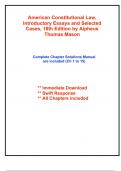American Constitutional Law,
Introductory Essays and Selected
Cases, 18th Edition by Alpheus
Thomas Mason
Complete Chapter Solutions Manual
are included (Ch 1 to 15)
** Immediate Download
** Swift Response
** All Chapters included
,Table of Contents are given below
0. Introduction: A Political Supreme Court
1. Jurisdiction and Organization of the Federal Courts
2. The Constitution, the Supreme Court, and Judicial Review
3. Congress and the President
4. Federalism
5. The Electoral Process
6. The Commerce Clause
7. National Taxing and Spending Power
8. Property Rights and the Development of Due Process
9. The Bill of Rights and the Second Amendment
10. Criminal Justice
11. Freedom of Expression
12. Religious Liberty
13. Privacy
14. Equal Protection of the Laws
15. Security and Freedom in Wartime and Pandemic
,Solutions Manual organized in reverse order, with the last chapter displayed first, to ensure
that all chapters are included in this document. (Complete Chapters included Ch15-1)
FIFTEEN
Security and Freedom in
Wartime and Pandemic
I. CHAPTER OUTLINE
The Fragility of Civil Liberties
The Patriot and Freedom Acts
Anti-Terrorist Policies in Court
Prisoners of War or Something Else?
Military or Civilian Justice?
“Inter Arma Silent Leges”
The Pandemic and Constitutional Rights
II. CHAPTER OVERVIEW AND OBJECTIVES
Chapter Fifteen was initially added to American Constitutional Law for the Fourteenth
edition. This was the first edition that was published following the horrific attacks on
September 11, 2001. In the bloodiest attacks on American soil since the Civil War, the 19
hijackers killed more than 3,000 persons within the span of two hours. The effects of that
morning’s destruction on families, society, the economy, politics—and the
Constitution—continue to be felt. Since publication of the Seventeenth edition, the
developments most relevant to this chapter are the Covid-19 pandemic, and the failure to
renew some provisions of what came to be known as the Freedom Act. Accordingly, the
Eighteenth edition includes one of the Supreme Court’s first responses to pandemic-
related restrictions in the states.
Unlike any other single series of occurrences in the past half century, those events
and the policy responses to them have thrust to the forefront a tension that is older
than the Constitution: Security versus freedom. Measures designed to increase
security often entail a constriction of liberty. Too much insistence on maintaining
liberties may jeopardize security. American constitutional history is partly an
attempt to find an appropriate balance between the two, although a perfect
adjustment will probably forever remain out of reach. The record suggests that we
are eager to embrace liberty when danger seems remote but that we lean in the other
direction when the nation seems imperiled. There is thus a recurring pattern of
under- and over-reaction. Underestimating threats to security, whether in 1860,
1941, 1946, or 2000 (to pick but four crisis-laden years), may lead to needless
contractions of freedom in response. Sometimes lost amidst shifting policies is
recognition that the nation’s strength derives as much from the ideas and values it
, reflects as from the armies and munitions it deploys. “Constitutional law,” wrote
Professor Edward Corwin decades ago, “has for its primary purpose not the
convenience of the state but the preservation of individual rights.”
Charters of individual liberties, like a bill of rights, are commonplace today in the
constitutions of many governments in the world. Yet even a casual observer of world
affairs knows that civil liberties are more likely to be preserved (or suspended) in some
countries than in others. Moreover, as cases in this book illustrate, American freedoms
have at times expanded and contracted in accordion-like fashion. Exactly why civil
liberties thrive in one place or time and not another is a complex phenomenon, but this
much is certain: Civil liberties are fragile.
Civil liberties rest on at least two kinds of supports: First are rules and institutions.
Federal and state statutes and constitutions carve out certain rights for protection, and
courts and other bodies exist to enforce them. Second are the attitudes and values of the
people generally and of opinion leaders and those entrusted with making, enforcing, and
interpreting the laws. As events since September 11 have demonstrated, the interplay
between these two sets of supports takes place within a context where, from one month to
the next, the felt needs for freedom and security compete in shaping policy. As Justice
Brandeis observed 89 years ago in his dissenting opinion in Olmstead v. United States
(see Chapter Ten), the most frequent and often the most serious threats to civil liberties in
American history have come not from people intent on throwing the Bill of Rights away
but from well-meaning, though overzealous, people who find the Bill of Rights an
inconvenience, standing in the way of objectives deemed more urgent and important at
the time. Thus, constitutional protections ironically are sometimes worth the least when
they are needed the most.
With few exceptions, decisions by the Supreme Court since 2001 and related to that
year’s terrorist attacks suggest that, in contrast to some earlier eras, the Supreme Court
has decided not to be irrelevant. If this pattern holds, the executive will not be able
assume judicial deference when exigencies pit security against freedom. Chief Justice
Warren—hardly bashful himself about wielding judicial power—once candidly
acknowledged that courts are unreliable bulwarks during emergencies. Other parts of the
government, he said, “must bear the primary responsibility for determining whether
specific actions they are taking are consonant with our Constitution.” It is “the
Legislature and the elected executive who have the primary responsibility for fashioning
and executing policy consistent with the Constitution.” Beyond them, he added, “the day-
to-day job of upholding the Constitution really lies elsewhere. It rests, realistically, on the
shoulders of every citizen.” Warren’s assessment remains a sobering reminder that the
Constitution in practice is much more than what the judges say it is.
III. KEY TERMS
Authorization for Use of Military Force
Patriot Act




